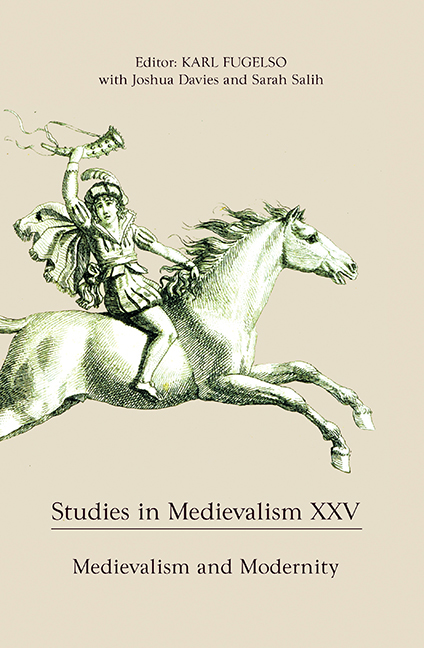Book contents
- Frontmatter
- Studies in Medievalism
- Acknowledgments
- Contents
- List of Illustrations
- Volume XXV 2016
- Editorial Note Karl Fugelso
- I Medievalism and Modernity: Some Perspective(s)
- II Medievalist Visions
- Introduction
- In/visible Medieval/isms
- Art, Heritage Industries, and the Legacy of William Morris in Michel Houellebecq's The Map and the Territory
- Travel in Space, Travel in Time: Michael Morrow's Approach to Performing Medieval Music in the 1960s
- Imagining Medieval Chester: Practice-based Medievalism, Scholarship, and Creativity
- The Anachronic Middle Ages: Public Art, Cultural Memory, and the Medievalist Imagination
- Medievalisms of Moral Panic: Borrowing the Past to Frame Fear in the Present
- Extra-Temporal Place Attachment and Adaptive Reuse: The Afterlives of Medieval English Anchorholds
- Here Be Dragons: Mapping Space and Time, Medieval and Modern
- Contributors
- Miscellaneous Endmatter
Art, Heritage Industries, and the Legacy of William Morris in Michel Houellebecq's The Map and the Territory
from II - Medievalist Visions
Published online by Cambridge University Press: 05 July 2016
- Frontmatter
- Studies in Medievalism
- Acknowledgments
- Contents
- List of Illustrations
- Volume XXV 2016
- Editorial Note Karl Fugelso
- I Medievalism and Modernity: Some Perspective(s)
- II Medievalist Visions
- Introduction
- In/visible Medieval/isms
- Art, Heritage Industries, and the Legacy of William Morris in Michel Houellebecq's The Map and the Territory
- Travel in Space, Travel in Time: Michael Morrow's Approach to Performing Medieval Music in the 1960s
- Imagining Medieval Chester: Practice-based Medievalism, Scholarship, and Creativity
- The Anachronic Middle Ages: Public Art, Cultural Memory, and the Medievalist Imagination
- Medievalisms of Moral Panic: Borrowing the Past to Frame Fear in the Present
- Extra-Temporal Place Attachment and Adaptive Reuse: The Afterlives of Medieval English Anchorholds
- Here Be Dragons: Mapping Space and Time, Medieval and Modern
- Contributors
- Miscellaneous Endmatter
Summary
For the reading public and beyond, the French author Michel Houellebecq is arguably most notorious for his public denunciation of Islam as “stupid,” a statement that led to him being tried unsuccessfully in 2002 for religious and racial incitement. Because of this and other controversial views on contemporary society (in particular about commercial sex, which he praises), the author is widely perceived as a nihilist, an ideologically scattergun commentator whose provocations are locatable within a French tradition of “critical insult” reaching from the inflammatory cynicism of 1960s magazines such as Hara Kiri through to the incendiary iconoclasm of Charlie hebdo, on whose cover Houellebecq featured the week when twelve of that magazine's staff were shot to death. Yet the unsurprising obverse to his public pronouncements against religion is the ongoing fascination throughout Houellebecq's oeuvre with belief and the communities that form around it. His novels are renowned for their explorations, albeit extremely critical, of utopian and dystopian traditions, from the philosophical and the sociological through to the New Age. His 1998 Atomised (Les Particules élémentaires), for instance, caused wide outcry with its deflationary assessment of the legacy of 1960s counter-cultural and feminist utopias, while also offering a pessimistic prediction about the displacement of human reproduction by science. 2001's Platform (Plateform) examines not only ecotourism's monetization of ecological idealism, but also the life-denial of Islamist terrorism. In 2006 The Possibility of an Island (La Possibilité d'une île), the title of which alludes to Aldous Huxley's exploration of a utopian society in Island (1962), fuses a depiction of New Age cults with a dystopian forecast of how the scientific promise of human cloning will turn out.
His 2011 novel La Carte et le territoire (here referred to in its English translation The Map and the Territory) continues this preoccupation in a way that brings it into the orbit of medievalism studies. In this novel we encounter discussions of the utopian cooperative societies devised by proto-socialist Charles Fourier (1772–1837), of the futuristic idealism of modernist design and architecture, epitomized in the work of Le Corbusier (1887–1965), but the most attention is paid to the medieval-inspired utopias of William Morris (1834–96). What makes this novel distinctive within Houellebecq's oeuvre is that the evocation of Morris constitutes what is arguably the author's most receptive treatment of any utopian program so far.
- Type
- Chapter
- Information
- Studies in Medievalism XXVMedievalism and Modernity, pp. 71 - 88Publisher: Boydell & BrewerPrint publication year: 2016



